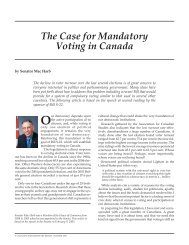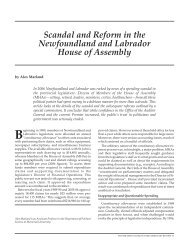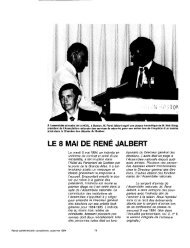Dans les médias sociaux, le contenu est roi Tendre la main aux ...
Dans les médias sociaux, le contenu est roi Tendre la main aux ...
Dans les médias sociaux, le contenu est roi Tendre la main aux ...
You also want an ePaper? Increase the reach of your titles
YUMPU automatically turns print PDFs into web optimized ePapers that Google loves.
Internet-Based Campaigning and Party Systems », Revue<br />
canadienne de science politique, vol. 40, nº 3 (septembre<br />
2007), p. 639‑657.<br />
16 Tamsin McMahon, « E<strong>le</strong>ct Big Brother: The surprising<br />
ways political parties get inside your head », Mac<strong>le</strong>ans.ca,<br />
13 octobre 2012 (consulté <strong>le</strong> 6 juin 2013). Internet : .<br />
17 Tom F<strong>la</strong>nagan, « Un parti misant sur une base de données : <strong>la</strong><br />
course à <strong>la</strong> direction de l’Alliance canadienne de 2002 », Revue<br />
par<strong>le</strong>mentaire canadienne, vol. 26, nº 1 (printemps 2003),<br />
p. 8‑11.<br />
18 Pour en savoir plus, consulter <strong>le</strong> site http://politwitter.ca/page/<br />
about (en ang<strong>la</strong>is seu<strong>le</strong>ment).<br />
19 Michael Oliveira, « How do you compare? New report<br />
reveals stats about social media usage in Canada », Mac<strong>le</strong>ans.<br />
ca, <strong>le</strong> 29 avril 2013 (consulté <strong>le</strong> 6 juin 2013). Internet :<br />
.<br />
20 Tamara A. Small, « La politique canadienne en 140 caractères :<br />
<strong>la</strong> vie des partis dans l’univers Twitter », Revue par<strong>le</strong>mentaire<br />
canadienne, vol. 33, nº 3 (automne 2010).<br />
21 Sounman Hong et Daniel Nad<strong>le</strong>r, « Which candidates do the<br />
public discuss online in an e<strong>le</strong>ction campaign?: The use of<br />
social media by 2012 presidential candidates and its impact<br />
on candidate salience », Government Information Quarterly,<br />
vol. 29, nº 4 (octobre 2012), p. 455‑461.<br />
22 Amy Mitchell et Paul Hitlin, « Twitter Reaction to Events<br />
Often at Odds with Overall Public Opinion », Pew Research<br />
Center, 4 mars 2013 (consulté <strong>le</strong> 6 juin 2013). Internet : www.<br />
pewresearch.org/2013/03/04/twitter‑reaction‑to‑events‑often‑<br />
at‑odds‑with‑overall‑public‑opinion/.<br />
23 Peter Dahlgren, « The Internet, Public Spheres, and Political<br />
Communication: Dispersion and Deliberation », Political<br />
Communication, vol. 22, nº 2, 2005, p. 147‑162.<br />
24 John Kean, « Structural Transformations of the Public<br />
Sphere », The Communication Review, vol. 1, nº 1, 1995.<br />
25 Pippa Norris, Digital Divide: Civic Engagement, Information<br />
Poverty, and the Internet Worldwide, Cambridge (Royaume‑<br />
Uni), Cambridge University Press, 2001.<br />
26 Elisabeth Gidengil, André B<strong>la</strong>is, Neil Nevitte et Richard<br />
Nadeau, Citizens, Vancouver, UBC Press, 2004.<br />
27 Tanni Haas, « From “Public Journalism” to the “Public’s<br />
Journalism”? Rhetoric and Reality in the Discourse of<br />
Weblogs », Journalism Studies, vol. 6, nº 3, 2005, p. 389.<br />
28 Greg Elmer et coll., « “Blogs I Read”: Partisanship and Party<br />
Loyalty in the Canadian Political Blogospher », Journal of<br />
Information Technology & Politics, vol. 6, nº 2 (été 2009).<br />
REVUE PARLEMENTAIRE CANADIENNE/ÉTÉ 2013 27






